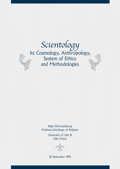Scientology has the characteristics of a religion. It has a theology, a set of exercises making it possible to reach the spiritual part in every human being, a “very bureaucratized” church structure, and religious rites. Several authors before us, even the most critical, have not doubted of its religious nature: Michel de Certeau, Roy Wallis, Bryan Wilson, Harriet Whitehead, Lonnie D. Kliever, Frank K. Flinn.
We find the following characteristics:
(1) It has techniques which are meant to make a path towards freedom as “a healthy spirit in a healthy body.” L. Ron Hubbard and Scientologists carry very far the rationalization of religious life and its instrumentalization. Most often it has been rightly compared to Buddhism. Some have described it as a “technological Buddhism.” Others have seen a resemblance with Methodism due to the systematic character of auditing (pastoral counseling).
(2) It enables the follower to give sense to cosmic, historical and personal events; it offers the believer the conviction that he holds the solution to personal and group salvation; it enables the individual to be at cause in his life and not the effect of external causes.
L. Ron Hubbard is not a prophet who claimed a salvation path stemming from a revelation; he appeared as a spiritual researcher who progressively set up a salvation method,
which is a path to “achievement.”
(3) L. Ron Hubbard is not a prophet who claimed a salvation path stemming from a revelation; he appeared as a spiritual researcher who progressively set up a salvation method, which is a path to “achievement.”
(4) It rests on a personal experience, somewhat mystical, which enables one to contact his own spiritual nature. It implies a “religious virtuosity,” i.e., an important self-commitment, and thus it is not a religion of mass worship.
(5) Scientology has the character of a “this world” religion reminiscent of Sokka Gakkai where business success honestly obtained is seen as a sign of positive spiritual evolution. We can also draw a parallel between the ethics of Scientology and those of traditional Protestantism. In the latter case, success in worldly affairs testifies to a state of grace, and in the former it is the outward manifestation of the person’s work on his own personality, of a personal religious and moral code made up principally of psychological liberation techniques that free the individual spiritually, and the application of a very concrete system of morality.
(6) It is not a sect—it is not exclusive, and the follower is not obliged to renounce his former religion, although most practice Scientology exclusively.
(7) The religious character of the Church of Scientology has been asserted since the early 1950s, according to the brochure the Church of Scientology International published on the occasion of its 40th anniversary in 1994. The Church of Scientology International, headquartered in Los Angeles, is described as the Mother Church (as the one of Boston for Christian Scientists). There is reference to the parishioners and religious brotherhood, pastoral services and church-affiliated charitable works. Moreover, during the recent interviews of Scientologists that we have done, the religious dimension was more and more emphasized. By increasingly proclaiming its religious nature, Scientology attracts people in search of religion, whereas in its beginnings it attracted people seeking to solve personal problems. As Scientology developed, Dianetics became integrated into progress of the whole.
(8) Scientology includes utopian elements: L. Ron Hubbard has conceived a utopian project of “Clearing the planet,” which envisions a society free of insanity, criminals and war where the able can prosper, honest beings have rights and man is free to rise to greater heights. Ethics, spontaneously applied (open Bergsonian morals), will eliminate all the wrongnesses of existence and through theta being recovered, will be increased. The world should improve as the number of Scientologists grows.
(9) Scientology is born in a modern context. It gets from it certain elements (technicity, well-asserted methodical approach, importance of communication, well-being, understanding of organization, personal experience) which it has mixed with ancient spiritualistic traditions.
L. Ron Hubbard and Scientologists extend the use of instruments of rationality in the service of a mystical path, a self-transformation and a transformation of the world. It is probably for that reason that it appears unique among the religions.
Régis Dericquebourg
September 22, 1995




























